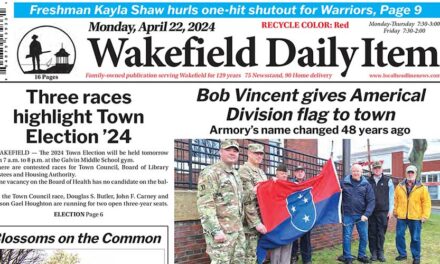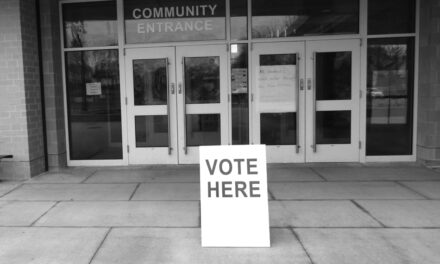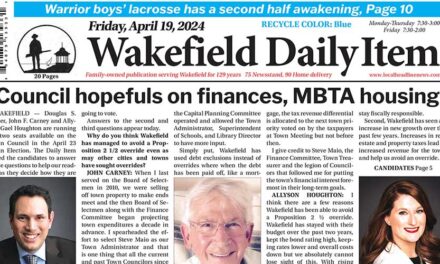By MARK SARDELLA
WAKEFIELD — As they have done for the last several years, town officials last night offered a public informational forum on next year’s town budget in advance of the May 4 Annual Town Meeting.
Finance Committee chairman Gerard Leeman, FinCom vice chairman Daniel Sherman, Town Administrator Stephen P. Maio and School Superintendent Dr. Stephen Zrike hosted a live cable television program at WCAT to explain and answer questions about next year’s budget. They also provided context with a look at past years and future projections.
Maio said that like every year, FY 2016 will have both “challenges and opportunities.” He said that the biggest opportunity was being able to expand and move forward the School Department’s budget, with initiatives including full-day kindergarten.
Sherman graphically showed a history of the town’s receipts, including tax levy, state aid and local receipts. He called the tax levy the “steady state” of local revenues, whereas state aid tends to fluctuate. He said that over the last 25 years, the tax levy has become a larger percentage of total revenue, climbing from 67 percent in 1990 to 77 percent today.
Meanwhile, Sherman said, state aid has dropped from over 20 percent to barely 11 percent of total revenue. It climbed from $6.6 million in 1990 to $11 million in 2002 and has been dropping since, he said.
Maio noted that while the drop in state aid is frustrating, it “has in fact made us stronger and insulated us from the vagaries of the state.” He said that the largest portion of state aid is Chapter 70 aid to education which comes in at about $5.4 million of the $9 million the town gets from the state. He insisted that under a more fair system, the town’s Chapter 70 funding should be closer to $7 million.
Local receipts have remained fairly consistent, Sherman said, with the relatively new hotel tax and local option meals tax helping to boost local receipts from 8 to 10 percent of total revenue. The most important piece of local receipts is the motor vehicle excise tax, he said, which has climbed toward $3.7 million in recent years.
Sherman touched on the town’s reserves, including the Stabilization Fund and Free Cash. He said that a rule of thumb is to have reserves equal to 10 percent of the budget. The town currently has 13 percent in reserves, Sherman said.
He also discussed the Debt Service Fund and capital spending, stressing the importance of capital investment to maintain the town’s infrastructure. He showed that between capital appropriations ($2 million) and bonds the town’s annual spending in this area has climbed to about $5 million, about 10 percent of the total budget.
Addressing large budgets, Sherman noted that the Group Health Insurance budget soared from about $3.5 million in 1998 to $12 million in 2012. By switching to the state’s Group Insurance Commission program, he said, the town has been able to cut those costs to $10 million a year while still putting $1.8 million into an OPEB account toward funding its future retiree health insurance liability. Sherman said that Wakefield is on pace to fully fund both its OPEB and pension liability by 2035.
Leeman said that the expected increase in the tax levy for FY 2016 is $2,253,000.
He noted that reserves equal to 13 percent of the town’s annual budget “means we have a lot of cash on hand.” That, he maintained, was a big part of why the 11.4 percent School Department budget increase was on the table this year.
“You have to do something with your cash sometimes,” Leeman, an accountant, explained. “Cash sitting around can cost you money. You need to think about what your strategic wants and needs are and you have to deploy cash at certain times.”
Maio said that the plan was to fund the 11.4 percent school budget increase through a combination of Free Cash, local receipts and the tax levy.
“It’s not an increase on your taxes,” Maio said. “It’s not a Prop. 2½ override. It is something that is doable within our framework right now.”
Leeman reviewed the budget basics for FY 2016. Total budget expenditures, he said, are $84,550,000, an increase of $4,502,000 (5.6 percent) over the FY 2015 budget. Total revenue for FY 2016 is projected to be $82,991,000. The $1,559,000 difference will be covered by Free Cash, Leeman said.
Zrike broke down the School Department’s requested $3,558,357 (11.4 percent) budget increase. He defended the decisions to introduce full-day kindergarten, increase staffing, upgrade technology and increase Special Education funding in one year.
“This is about righting what has been undone before,” he said. The needs, he maintained, exist right now and should have been addressed in prior years. He argued that the areas being addressed were not luxuries but “foundational blocks to become a great school system.”
A phased-in approach, Zrike maintained, would hamper the school system’s progress and momentum.
Addressing all of the areas next year, Zrike insisted, “positions us very well for the foreseeable future. It puts us in a position to be very competitive for years to come.”
Maio said that he was “impressed and comfortable with what Dr. Zrike and the School Committee have presented.” Maio did stress, however, that future fiscal restraint was key to making it work.
WCAT will repeat the program several times between now and the start of Town Meeting on May 4. WCAT will also make the video available for viewing on its website.




